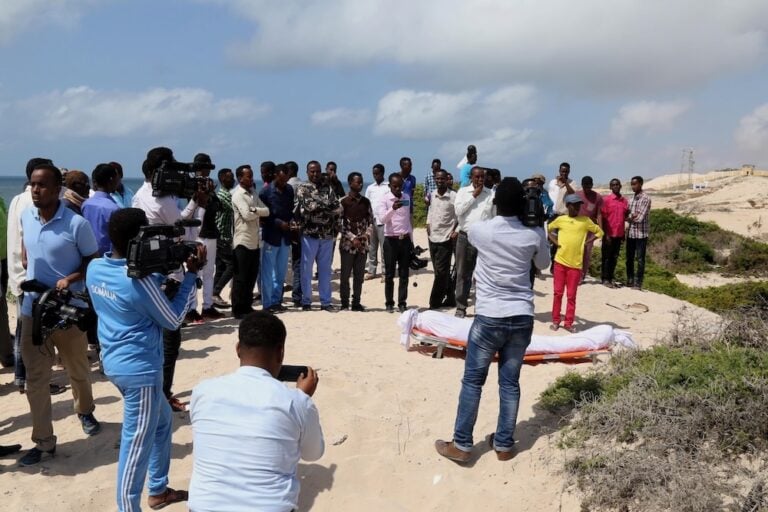To commemorate this day, NUSOJ celebrates the indispensable role that journalists play in Somali society in the face of an increasing wave of repression.
(NUSOJ/IFEX) – 3 May 2011 – To commemorate World Press Freedom Day, 3 May 2011, the National Union of Somali Journalists (NUSOJ) celebrates the indispensable role that journalists play in Somali society in the face of an increasing wave of repression.
The crackdown against journalists and news media organisations has been taking place in the context of the intensification of the fight between the Transitional Federal Government (TFG) with the help of the African Union troops and Al-Shabaab forces.
NUSOJ honors this day by shedding light on the numerous press freedom violations, that include arbitrary arrests, life-threatening attacks, judicial harassment against journalists and their media organisations, censorship and attempts to control independent media.
“The determined use of a wide array of draconian laws (media specific or general laws) to target journalists perceived as a threat to the authorities, and the inculcation of a culture of fear through various means of intimidation, arrests and coercion, together with clumsy tactics, which in turn have led to widespread self-censorship, are among the dangerous strategies used to curtail press freedom in Somalia,” said Omar Faruk Osman, NUSOJ Secretary General.
Judicial Harassment of Journalists in Somaliland: An Affront to Freedom of the Press
NUSOJ is deeply concerned about the charges levelled against several journalists in Somaliland in the past six months. Legal actions against journalists for their journalism work and the resultant arrests are entirely based on complaints lodged by public officials in Somaliland.
At least three Somaliland ministers filed defamation lawsuits against five private newspapers and their editors in the past six months. Journalists in Hargeisa explained that this is a worrying trend of suppression of independent reporting and criticisms through judicial intimidation, which has created a climate of fear among journalists and restricted the openness of public officials with journalists in Somaliland.
NUSOJ protests these legal persecutions of Somaliland journalists who sometimes find themselves unable to exercise their rights to press freedom. The ongoing persecutions also raises serious questions about the impartiality, integrity and independence of the judiciary of Somaliland.
NUSOJ appeals to Somaliland authorities to reverse the current trend of judicial harassment against journalists, which are increasing in scale, and guarantee freedom of the press by expediting important legislative reforms, including the decriminalization of defamation.
Brutal Attacks on Journalists and Media Houses in Mogadishu
Considering the persistence of brutality and impunity, as well as the repeated attacks against journalists and media houses in Mogadishu, the TFG falls short of taking effective measures to prevent attacks on or the harassment of journalists.
Since May 2010, NUSOJ documented 29 cases of journalists who were attacked or threatened by Al-Shabaab forces and security forces, as well as politicians of the TFG. Journalists have been briefly detained, beaten up and even threatened. Media houses were taken over illegitimately and closed down for specified periods of time.
The TFG has not only failed to carry out a effective, thorough, independent and impartial investigation into attacks against journalists – including killings – but has also perpetrated attacks against journalists by arresting Radio Shabelle journalists, forcing radio journalists to censor themselves from reporting sensitive issues and even propelling efforts to undermine and weaken NUSOJ, to undermine the voice of journalists.
While Al-Shabaab and other armed groups committed serious violations of press freedom, NUSOJ expresses its grave concern regarding the capacity and the willingness of the TFG to respect their obligations under the Transitional Federal Charter and international law.
NUSOJ demands that the TFG put an end to the harsh and oppressive tactics of its political figures, police, army and intelligence services, which are designed to intimidate and frustrate journalists.


